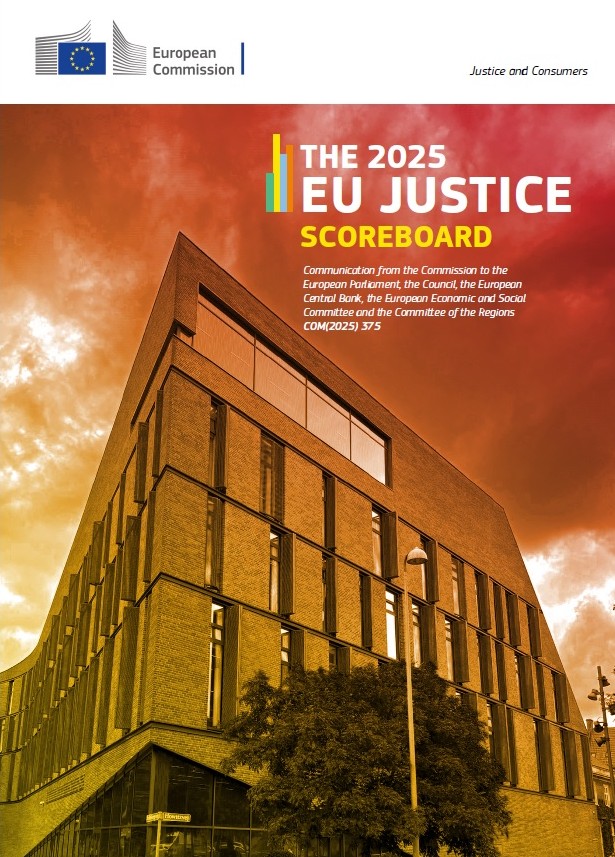EU Justice Scoreboard 2025 confirms the high level of the Czech judiciary

EU Justice Scoreboard 2025 confirms the high level of the Czech judiciary
The European Commission has released the latest edition of its annual report, the EU Justice Scoreboard for 2025. The document is made up of data collected by the European Commission in co-operation with the group of contact persons on national justice systems. Other sources include the Council of Europe's European Commission for the Efficiency of Justice, the European Network of Councils for the Judiciary, the Network of Presidents of the Supreme Judicial Courts of the EU, the Association of the Councils of State and Supreme Administrative Jurisdictions of the EU, the European Competition Network, Eurostat, and others.
This comparative overview tracks a wide scale of indicators, including, to name a few: the ratio of resolved cases to incoming cases, the length of proceedings at different levels of the justice system, perceived judicial independence by private companies and the general public, or the Member States' total expenditures on law courts. This year's 13th edition of the EU Justice Scoreboard reflects not only an emphasis on the values of the rule of law, democracy and human rights, but also on financial indicators. The goal of the EU is, among others, to support legal certainty which is essential for economic stability and growth. That led to the inclusion of certain indicators from the EU's single market.
We kindly bring to your attention the following conclusions relating to the Czech Republic:
1) As regards the number of incoming civil and commercial litigious cases, the Czech Republic ranked 4th highest in 2023, after Romania, Belgium and Spain. There was therefore a relatively substantial increase in first instance caseload compared to the previous year. The opposite is true in relation to administrative cases, where we hold the penultimate rank before Malta.
2) Czech judiciary continued a positive trend when comparing the estimated time needed to resolve litigious civil and commercial cases at first instance, moving from 3rd to 2nd place in the 2023 ranking. The estimated time is being successfully kept under 150 days. Even the estimated length of proceedings in litigious civil and commercial cases at all instances – from district courts to the Supreme Court – has improved from the previous year, and the Czech Republic is also ranked in the second place. This means that such states as Austria, the Netherlands, Germany, France, and the Scandinavian or Baltic countries all have slower courts.
3) The estimated time needed to resolve administrative cases at first instance is likewise continuously decreasing, and we have moved up a place in 2023 compared to 2022. There was also progress in comparing the length of proceedings before the regional courts and the Supreme Administrative Court. Here too the Czech administrative judiciary improved by a place and is ranked sixth fastest among the EU states.
4) When it comes to the ratio of resolved to incoming cases, Czech courts have dealt with more disputes than have been newly initiated. Compared to others, we remain in 5th place. This signals a positive trend in decreasing the volume of unresolved cases.
5) In 2023, as in previous years, our judiciary was a relatively small burden for the state budget compared to other European countries. General government total expenditure for the judiciary has been continually decreasing from 2021 onwards and represents less than 0,3% of the GDP.
6) The comparative overview has also pointed out certain areas of improvement. For example, when it comes to the provision of online information to the general public, we lag behind in communicating with speakers of foreign languages, in ensuring a more transparent access to the procedural rights of participants in judicial proceedings, or in utilising chatbots. The courts themselves can likewise improve their use of technologies – there are gaps, for instance, in the implementation of artificial intelligence.
7) Czech judiciary also lacks certain devices aiding judicial proceedings that are common in other countries. These include, for example, facilitating electronic access to case files for the individual parties to lawsuits or the victims of crimes. Participants to proceedings are currently unable to look into their case files online.
8) Data from both the general public as well as private companies relating to their perception of the judiciary's independence are very positive. The general public's confidence has increased by about 10% in 2023, reaching around 65%. The confidence of private companies in the independence of the judiciary has risen too.
9) Among the newly included indicators relevant to the EU's single market, namely how private companies perceive the independence of national competition authorities and that of the first instance public procurement review bodies, Czech Republic ranks in the bottom half of EU states. Data is only available for 2025, hence why there cannot be a comparison with previous years. These new indicators point to Czech Republic's shortcomings in these specific areas covered by EU law.
EU Justice Scoreboard 2025 is accessible in English here.
Aleš Pavel, Director of the Office of the President
Jan Bena, Department of Analytics and Comparative Law

